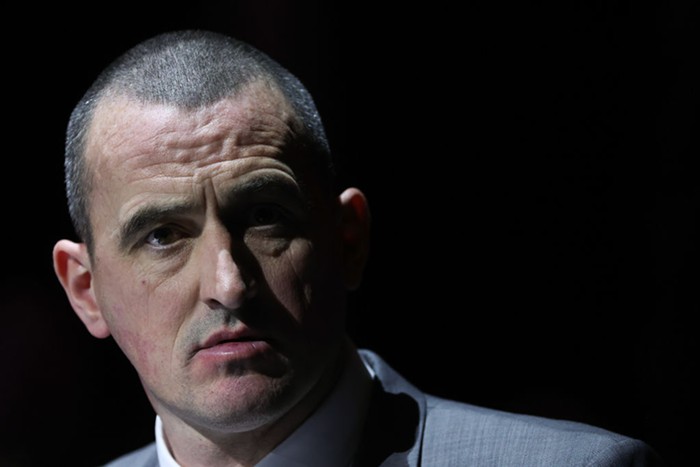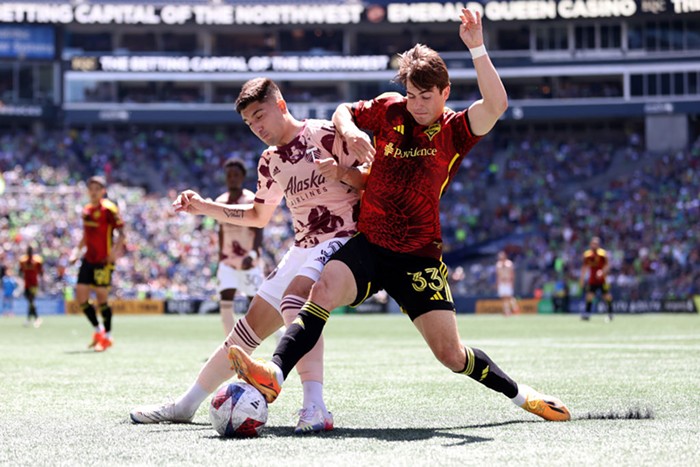When the Portland Timbers announced the firing of head coach Giovanni Savarese on Monday afternoon, it didn’t come as a surprise.
On Sunday night in the broiling heat in Houston, the Timbers put in one of the most pitiful performances of their entire MLS history: losing 5-0 to a team that was just a handful of points ahead of them in the Western Conference, failing to register a single shot on goal.
It was, after a year of inconsistent performances and locker room issues, a point of no return.
But the decision to fire Savarese, which came not 24 hours after the final whistle blew in Texas, raises more questions about the Timbers’ future than it does about their longest-tenured MLS manager.
Though it’s been lost somewhat in the frustration of the current season, Savarese achieved a remarkable amount of success in Portland—four straight playoff appearances, a dominant record against Seattle, a better win percentage than Caleb Porter, and, of course, two runs all the way to MLS Cup.
But Savarese’s tenure at the club was about more than results. What hurts most about his departure is what has hurt for the better part of two years now: the penalty shootout in the rain against New York City, the moment where the chance to lift MLS Cup in Portland slipped away.
That penalty shootout must have been the most painful moment of Savarese’s career. But he walked into his press conference just a few minutes later and spoke with feeling and wisdom and composure about what it all meant, how it all stacked up in his mind.
He said soccer was cruel, but he also said it was important—that it imparts lessons that go far beyond any result or trophy. He said he was proud of his players.
“For me, they are champions,” Savarese said.
After suffering through the petulance and immaturity of Porter, a man who frequently threw his players under the bus, Savarese was a breath of fresh air. He was approachable and good-natured and never under any circumstances shied from responsibility for his team’s performances.
The run that culminated with New York City lifting the trophy at Providence Park was Savarese’s finest coaching job: one in which he squeezed the most out of a collection of mostly unremarkable players, molding them, when it mattered most, into a unit that played with grit and energy and skill.
In the two seasons since, things soured. There was a constant hum of tension between Savarese and various players, and a blatant lack of effort like what the Timbers turned in against Houston will always fall on the coach.
I have no idea what the dynamics in the Timbers locker room have been this season, but I don’t think Savarese forgot how to coach overnight.
I also don’t think he’ll be unemployed for long. Longtime MLS commentator Adrian Healey tweeted in the aftermath of Monday’s announcement that Savarese “will be a slam dunk hire for the next MLS team lucky enough to get him.”
In some ways, Savarese may have been a victim of his own success in 2021. That team’s remarkable overachievement made the underwhelming performances of the last two years look worse by comparison, when in fact Savarese hadn’t had an elite level of talent to work with since the pandemic-affected 2020 season.
The roster management at the end of Gavin Wilkinson’s tenure was abysmal and made Savarese’s job all the more difficult. Last October, when the Timbers extended Savarese’s contract through 2025, it appeared to be a vote of confidence in the manager’s leadership through a transitional period of Timbers soccer.
Now, that contract must be viewed as yet another miscalculation by a rudderless club: If the Timbers believed in Savarese, they needed to get him better players who wanted to play for him. If they didn’t, they shouldn’t have signed him up for three more years.
Savarese has his shortcomings as a manager—he never got the Timbers playing particularly progressive soccer, even at their best—but he won a ton in New York with the Cosmos before he came to Portland, and he won a ton with the Timbers.
He’s renowned as an excellent tournament coach, which is more than handy in a league like MLS. He has admirers throughout the game for the way he treats people. He’ll most likely be fine.
The Timbers, on the other hand, are a black hole. When Porter left the club following the 2017 season, the Timbers job was one of the most attractive in MLS. Now, as the club searches for a new manager, it’s hard to see why top coaches with other options would want the job.
Where are the Timbers now? They have a reviled owner who covered for a sexual predator. They have an unproven, first-time general manager whose debut season has been a mess. They have a mediocre roster, falling attendance numbers, and a general atmosphere of instability.
It’s ugly stuff, and it has been for some time now. In the turmoil of the last two years, which saw the departure of Diego Valeri and the firings of Wilkinson and Mike Golub, Savarese was always a class act—the one representative of the club who consistently conducted himself with grace and humility, who embraced the city and its values.
The frustration with Savarese was understandable. Supporters have short memories and this season has been a disappointment. It’s a brutal business—job security, even for the best coaches, is an illusion.
But if you have faith in the broader organization to turn this ship around, not just to win more games but to make supporting their team enjoyable again in the way it was for much of its existence, you haven’t been paying attention.
As Savarese himself understood, soccer at its best, its most aspirational, is about more than wins and losses.
Savarese won’t be remembered fondly in Portland just because he led the team to MLS Cup twice in less than six seasons. He’ll be remembered fondly because of how he conducted himself—in such stark contrast to his now former boss, the man who was no longer going to be involved in operational decisions at the club but was the first person quoted in the press release announcing the firing.
I’ll miss Savarese’s passion for the club. I’ll miss his wild goal celebrations and his tournament nous. I’ll miss him because he always seemed like a person of character. There aren’t many of those at Providence Park.

















